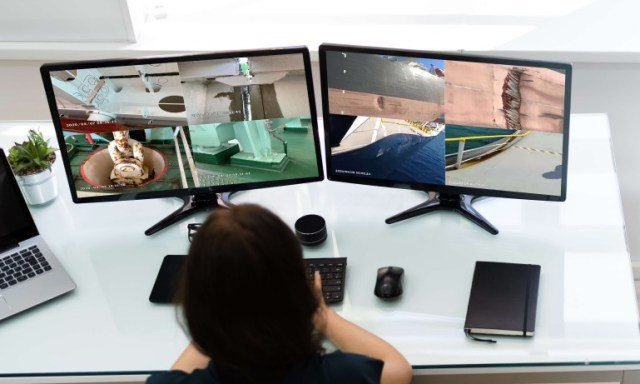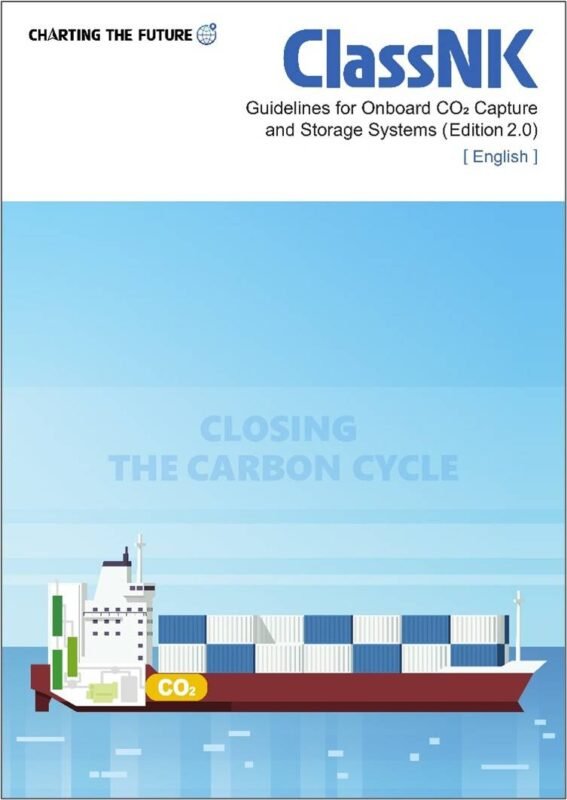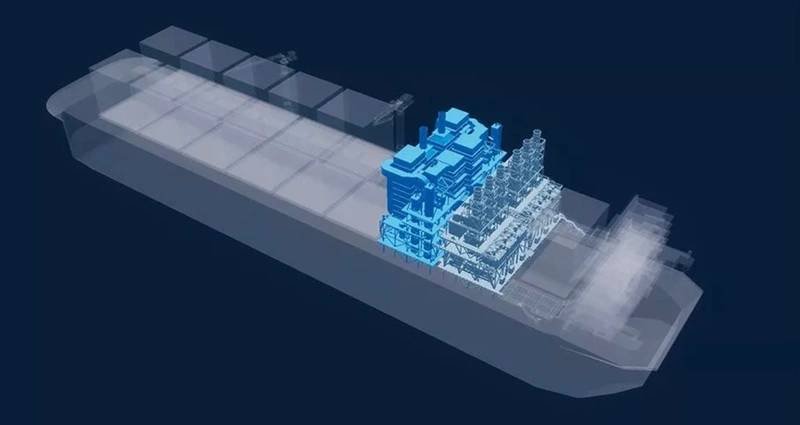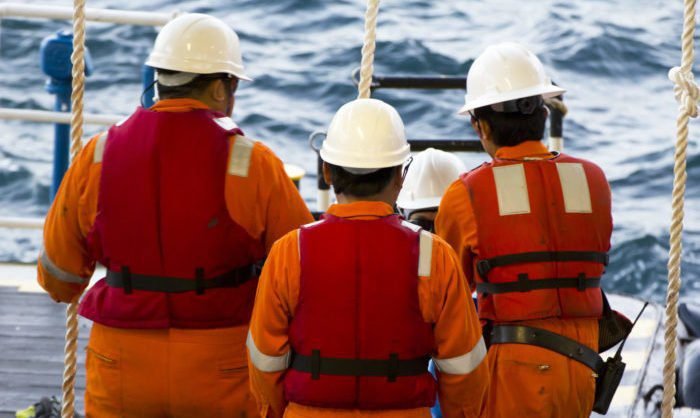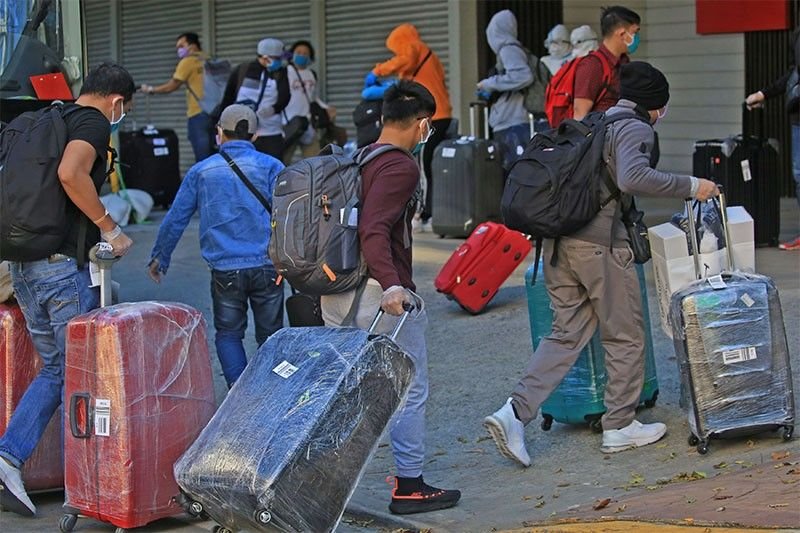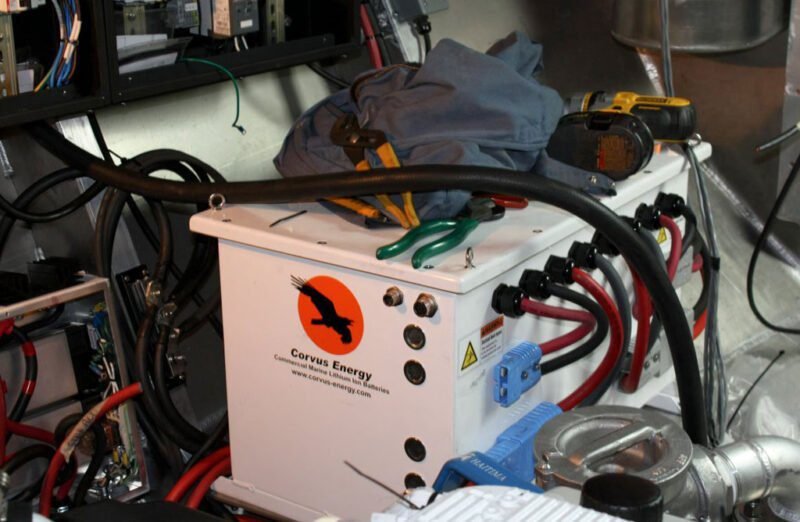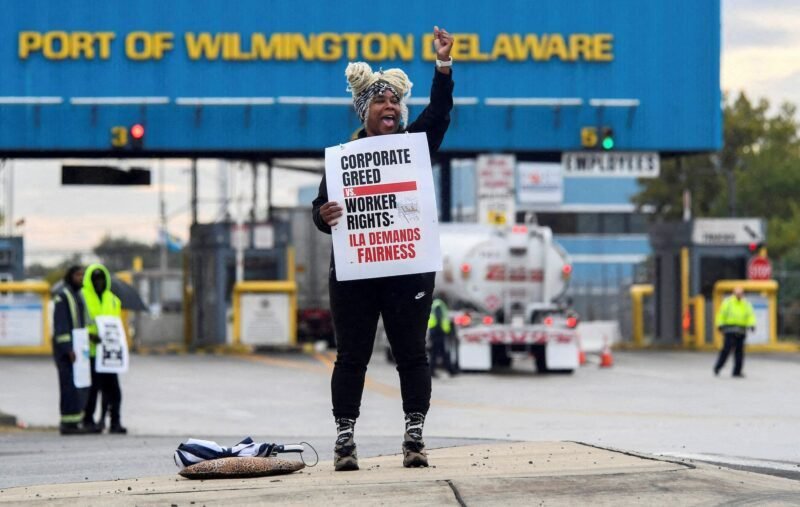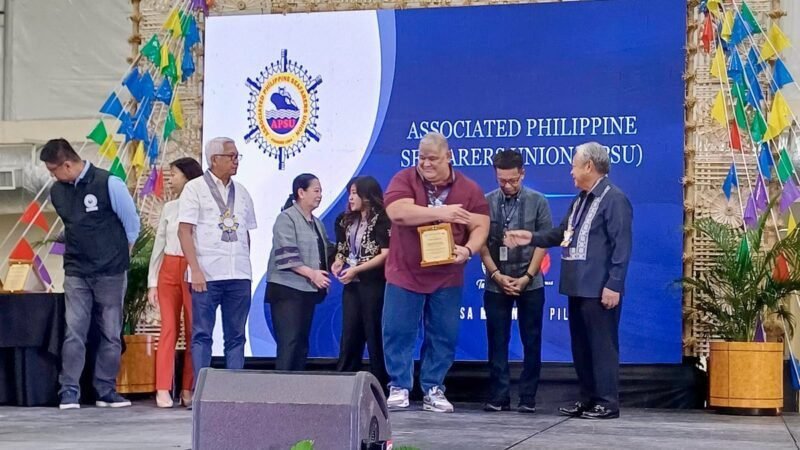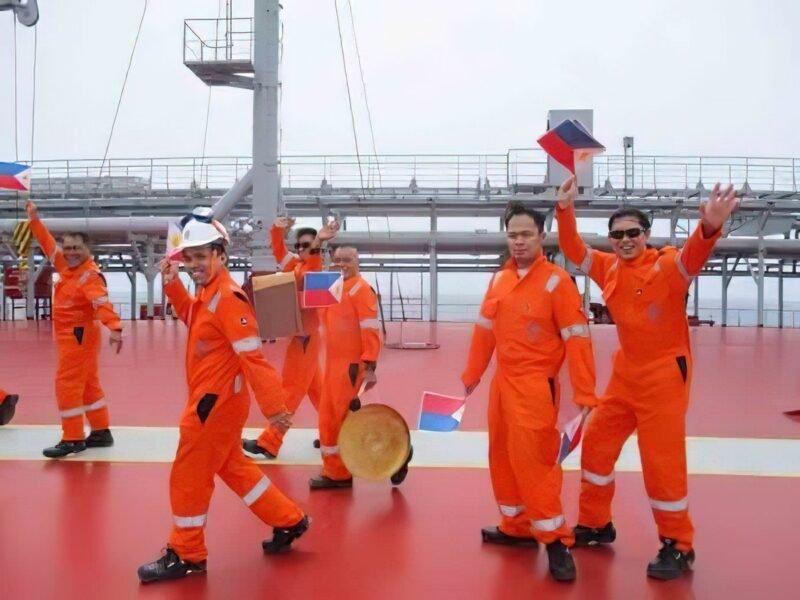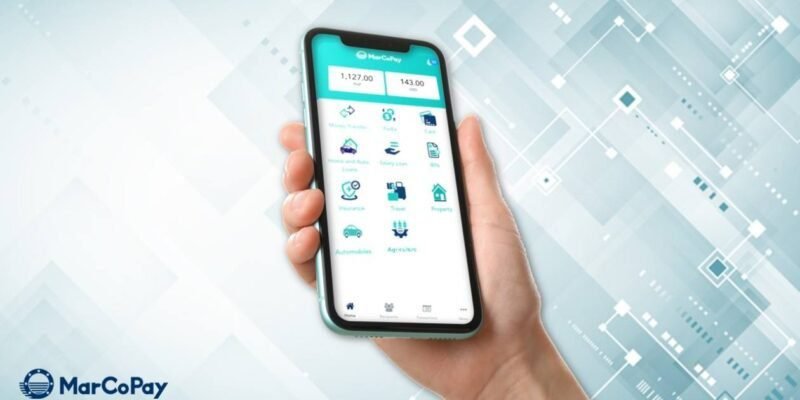Following Stories in this News Digest for the week from 06 Sep 2021 to 11 Sep 2021 in descending order:
- Indian Crew Freed from Gaol After Intervention by Maritime Charity
- NYK launches MarCoPay, electronic money platform for seafarers
- Vessel identity laundering: an emerging threat to maritime trade
- GRSE and Naval Group of France Tie Up to Make Surface Ships in India
- Seafarers to Receive 4.5% Pay Increase Under ITF-Employer Agreement
- CO2 Capture and Storage to be Installed on Dutch Feeder Vessel
- World’s First IMO Type B VLEC Launched at Jiangnan Shipyard
- ILA Says Union Will Not Service Automated Ships Without Crews
- NYK Testing AI-powered Collision Avoidance System
- LR forms industry-first collaboration with Inmarsat on remote surveys
- Persistent Bullies Should Be Removed from Ships
- Two Crew Injured and One Possibly Kidnapped from Gabon Anchorage
- Record order of containers to help relieve maritime traffic congestion
- India announces it will help Russia convert Arctic into global trade route
- Philippines: Seafarers’ magna carta seen to become law
- Japanese shipping giant planning to start autonomous cargo ships by 2025
11 Sep: Indian Crew Freed from Gaol After Intervention by Maritime Charity
Finally the ordeal for five Indian crew, wrongly imprisoned in Iran for six months is over thanks to the intervention of the Sailors’ Society. The men were apparently arrested by the Iranian Coastguard and accused of transporting illegal oil.

The men had served aboard the 41 year old, Tanzanian flagged MT Manaman 8 and were simply abandoned by their employers and captain after their arrest in early March. The 870dwt ship was reportedly operated by the Arabian Sun Inc. of the UAE. At first the men had no way of contacting their families with at least one hired by an agent in India who, having taken what was said to be an exorbitant fee for the appointment, refused to answer any questions as to the man’s whereabouts. Eventually one man’s father found where his son was and contacted other families.
Despite the attendance of Indian Embassy staff the matter stagnated until July 29 when the crew were briefly released, only to be rearrested almost immediately as there was nobody, the ship owner, his representative or any shipping agent present to receive or fund them them and make the necessary arrangements for their repatriation to India.
The maritime charity had by this time already been pleading the mens case in the person of Sailors’ Society’s India community development manager Manoj Joy, working in conjunction with the Indian Embassy and the charity’s contact in the Middle East, Shaheen Sayyed. Reference
11 Sep: NYK launches MarCoPay, electronic money platform for seafarers
Japanese global transportation company NYK has launched electronic money platform “MarCoPay” for seafarers. Payment of salary by “MarCoPay” has begun this year. It is being used for the first time anywhere in the world. This electronic money is expected to solve the problems about cash in the ship. In future, “MarCoPay” will expand its services by adding loan service, introduction of insurance, medical treatment service and real estate.
This electronic money is expected to solve the problems about cash in the ship. In future, “MarCoPay” will expand its services by adding loan service, introduction of insurance, medical treatment service and real estate. It will be economic sphere for seafarer. NYK plans to expand “MarCoPay” operations in other Asian countries such as Myanmar in the future. The company aims to bring happiness for seafarers through “MarCoPay”.(JA). Reference
11 Sep: Vessel identity laundering: an emerging threat to maritime trade
Criminals are fraudulently obtaining vessel registration numbers to evade sanctions on maritime trade, researchers say, warning that illicit export operations are becoming “significantly more sophisticated”.
C4ADS, a non-profit organisation focused on transnational security issues, says it has identified multiple cases where the International Maritime Organization (IMO) has been deceived into issuing “clean” identification numbers to sanctioned vessels.

The practice, referred to as identity laundering, means blacklisted ships appear legitimate in the eyes of trading companies, financial institutions and authorities. This results in “unprecedented challenges for maritime regulators and risks undermining global shipping practices”, C4ADS says in a detailed report.
The findings mark a departure from techniques identified in previous investigations. Researchers have long warned that some vessel operators have found ways to manipulate automatic identification system (AIS) signals, temporarily disguising their true identity or location.
Its research finds that sanctions evasion operations have found a way to trick the IMO into issuing a seemingly new and legitimate identity for a vessel, where in reality no such new vessel exists. It refers to this fresh registration as a “shell identity”.
Techniques including physical identity tampering – such as painting over a ship’s original IMO number – and the submission of misleading documentation are used to make the registration application appear legitimate. In some cases, multiple existing vessels are involved as part of the spoofing process. Reference
10 Sep: GRSE and Naval Group of France Tie Up to Make Surface Ships in India
In a development that some analysts have termed a step towards transitioning from ‘Make in India’ to ‘Make from India’, Garden Reach Shipbuilders and Engineers Ltd, (GRSE), a Miniratna (Category 1) defence PSU and a leading warship-building company, signed a memorandum of understanding (MoU) on Thursday with Naval Group of France, a leader in the European maritime defence industry. The two firms will collaborate in the field of surface ships that will cater to the requirements of India and international naval forces.

Under the administrative control of the defence ministry, GRSE primarily attends to the shipbuilding needs of the Indian Navy and the Indian Coast Guard.
The pact also seeks to leverage the capabilities of both firms for meeting the growing requirements of the shipbuilding industry and offer a robust world-class product, utilising the state-of-the-art capabilities of both the organisations. This blend of modern technology, innovation and management of resources by Indian and French naval industrial leaders will be a real value proposition for international navies, officials say. Reference
10 Sep: Seafarers to Receive 4.5% Pay Increase Under ITF-Employer Agreement
The collective bargaining structure between maritime employers and unions representing crew members working aboard flag of convenience vessels reached an agreement for a 4.5 percent increase in wages and compensation over two years for seafarers as well as an increased contribution to the seafarers’ support fund from the employers. Both sides said that the agreement, which had been delayed 17 months due to the pandemic, was an important step to recognize the seafarers and provide stability to the shipping industry.

Under the terms agreed to under the International Bargaining Forum (IBF) Framework Agreement, seafarers will receive a three percent wage increase starting January 1, 2022, and a further one-and-a-half percent increase starting January 1, 2023. It also calls for an increase in contribution to the IBF Seafarers Support Fund, which provides for the welfare of seafarers aboard vessels covered by IBF agreements.
“The negotiations were particularly challenging due to the profit variations in the industry, as well as the increased operational costs due to the pandemic,” the ITF said in announcing the agreement. “However, both parties acknowledged the need to recognize the sacrifices that seafarers have made during the pandemic, continuing to keep global trade moving whilst unable to return home following the expiry of their contracts, and receiving no wage increase in 2021.” Reference
10 Sep: CO2 Capture and Storage to be Installed on Dutch Feeder Vessel
A Dutch technology company Value Marine that has also been developing a new generation of scrubbers reports that it will install the first CO2 capture and storage unit on an operational vessel. Other companies, including a consortium in Japan, have been testing designs for CO2 capture, while Value Marine says that it has developed a complete lifecycle system that will permit the CO2 to be captured, discharged onshore, and the containment system returned to the ship for further use.

Value Maritime’s system is based on a patented technology to remove CO2 from the vessel’s exhaust gas. A module captures CO2 from the vessel’s exhaust and uses the CO2 to charge a CO2 battery while the vessel is in operation. The charged CO2 battery will then be offloaded in ports and transported to CO2 customers, such as the agricultural sector, who re-use the CO2. After the CO2 is discharged, the battery returns to the vessel, to be recharged with CO2 creating the circular system.
The first installation of the system is planned for October 2021. It will be installed aboard a 13,000 dwt feeder containership the Nordica, owned by Visser Shipping and operated by X-Press Feeders. The 498-foot-long vessel was built in China in 2011 and operates in the North Sea. Class society Bureau Veritas will provide the relevant approval of the system. Reference
10Sep: World’s First IMO Type B VLEC Launched at Jiangnan Shipyard
The world’s first IMO Type B Very Large Ethane Carrier (VLEC), the ABS-Classed Pacific Ineos Belstaff, has been launched at Jiangnan Shipyard.
The first of an order of four of the largest VLECs ever commissioned, the 99,000 cbm dual-fuel vessel is designed for long haul ethane transportation but can also handle other liquified gas cargoes such as LPG and ethylene.

“Launch of this vessel is a key milestone in the development of the industry. It’s significant not simply because of its scale but in the flexibility, it offers operators to adapt to an evolving global marketplace. As the world’s leading Class for gas carriers, we are proud to have been able to use our extensive experience to support delivery of this project,” said Sean Bond, ABS Director, Global Gas Development. Reference
09 Sep: ILA Says Union Will Not Service Automated Ships Without Crews
In its ongoing efforts to resist all forms of automation in the maritime world, the powerful U.S. International Longshoremen’s Association announced that its members would not service automated vessels operating without crews. Citing issues of safety and security the union has long fought automation and even before that resisted the move to containerization.

Responding to various recent media reports about the advancements in shipping automation and specifically, the efforts by Yara, NYK, and others developing automated container ships, ILA President Harold Daggett said, “Don’t sail them into ILA ports from Maine to Texas, Puerto Rico, and Eastern Canada – they won’t be unloaded or loaded by ILA members.”
The ILA staged fierce opposition to all forms of automation. In 2018, the union negotiated a new six-year master contract covering its tens of thousands of workers. Beyond the ports it works, the ILA has also sought to support other unions and been aggressive in its calls to block automation
“Workers around the world are under assault from the threat of automation by greedy companies only interested in making money and eliminating workers who helped them build their success and companies,” said ILA President Daggett. “It’s got to stop, and my ILA will do what it needs to do to save our jobs and the jobs of maritime workers around the world.” Reference
09 Sep: NYK Testing AI-powered Collision Avoidance System
Japanese shipping company Nippon Yusen Kabushiki Kaisha (NYK) is testing a navigation and collision avoidance system in another step toward autonomous cargo ship operations.
NYK and MTI Co. Ltd. (MTI) have installed Orca AI’s Automatic Ship Target Recognition System onto an NYK Group ship to assess the system’s ability to automatically recognize dangerous targets and other vessels that may be overlooked by the human eye, especially at night and in congested waters through vision sensors and thermal cameras, as well as artificial intelligence (AI)-powered algorithms which constantly analyze the environment and alert crew to dangerous situations.
The navigation and collision avoidance system is engineered to help create a new lookout support system for vessels by providing improved visibility in difficult conditions, preventing human error, and helping crews make informed decisions, Orca AI said. Reference
08 Sep: LR forms industry-first collaboration with Inmarsat on remote surveys
Lloyd’s Register and Inmarsat, the world leader in global, mobile satellite communications, have announced an industry-first collaboration between a satellite communications provider and classification society to provide a connectivity solution that will address challenges experienced during remote surveys.

The new solution uses LR Remote, a specifically engineered application for remote inspection that enables crew members to livestream video, photos and audio from on board a ship to an LR technical specialist located elsewhere and will be empowered by Inmarsat’s Certified Application Provider dedicated bandwidth service called Fleet Connect, available on the Fleet Xpress digital platform.
Fleet Connect provides an uninterrupted dedicated satellite link between vessels and seafarers, offering users function-specific bandwidth that is independent of business-critical vessel operations or crew communications. With no additional communication hardware required to run this application, the separation allows LR Remote to be enabled remotely without any intervention on-site.
“Inmarsat is delighted to work with Lloyd’s Register on this first-of-its-kind solution, which addresses a specific industry challenge,” said Alberto Perez, Director, Strategy and Business Development, Inmarsat Maritime. “With Fleet Connect’s dedicated connectivity running on the digital Fleet Xpress platform, we can assure high speed uninterrupted access so that remote surveyors are guaranteed a solution that is always available and always reliable when it is most important.” Reference
07 Sep: Persistent Bullies Should Be Removed from Ships
Bullying and harassment is distressing for any victim, and for seafarers, who work and live 24 hours in a ship, it can even be worse.
A zero-tolerance approach to bullying should be in place on all vessels, with abusive crew members removed from the ship if they repeatedly harass a colleague, according to some mental health experts.
Former chief engineer Stephan Vecchi believes the maritime industry must have a strict two-strike policy to protect seafarers from bullies.

“Usually, it’s one person who starts the bullying and you can find them pretty fast because they are typically a troublemaker,” he said in a video interview with Mental Health Support Solutions (MHSS). “This person should get a warning and then be removed if it’s not possible to stop the harassment.”
Bullying was one of the contributing factors to the 60% surge in seafarers calling the MHSS phone line from April to June 2021. Issues raised during the calls included anxiety, bullying or crew conflict arising from limited experience with different cultures or nationalities.
Victims of bullying aboard vessels should speak to a trusted colleague, officer or the Master, according to Vecchi. However, seafarers working with people from different countries and cultural backgrounds may struggle to talk openly to other crew members – a more common issue now than in Vecchi’s day.
The ship managers must ensure to mix the crew with their good judgement, to avoid groupism. Any indication of groupism should be taken seriously. Reference
07 Sep: Two Crew Injured and One Possibly Kidnapped from Gabon Anchorage
The joint French and British reporting center monitoring activity in the Gulf of Guinea is confirming reports of a serious incident over the weekend in Gabon which left two crew members injured. Security services are reporting that a third crew member might have been kidnapped. The assault comes after an apparent lull in serious incidents recently in the Gulf of Guinea region.

The Maritime Domain Awareness for Trade – Gulf of Guinea (MDAT-GoG), a cooperation center operated since 2016 by the UK Royal Navy and the French Navy, issued an advisory saying that early on September 5 armed intruders boarded a vessel in the anchorage at Libreville, Gabon.
They are reporting that two crew members were injured but said that the Gabon authorities have secured the vessel and the center considered the incident closed.
International security analysts, however, are reporting that they believe a third crew member is missing and “is presumed to have been kidnapped,” writes Dryad Global. Reference
07 Sep: Record order of containers to help relieve maritime traffic congestion
Hapag-Lloyd AG, the German international shipping and container transportation agency has announced it has ordered 75,000TEU containers, which will be manufactured in China and delivered within the fourth quarter of 2021.
The order aims to ease the scarcity of empty containers causing provision bottlenecks, disrupting shipping, and causing further shocks to the global economy.

CEO of Hapag-Lloyd, Rolf Habben Jansen said “Today about 20% more containers are bound in shipment while transporting the same amount of cargo before the crisis. With our recent container orders, Hapag-Lloyd is further contributing to ease the challenging situation for our customers worldwide.”
Hapag-Lloyd has a container inventory of more than 2.8 million TEU, among them 250,000 TEU reefer containers for refrigerated cargo. Reference
06 Sep: India announces it will help Russia convert Arctic into global trade route
India plans to help develop Russia’s Northern Sea Route and convert it into a commercial artery International, announced the Indian Prime Minister, Narendra Modi.
PM Modi also noted that despite major disruptions caused by the pandemic, Moscow and New Delhi have made significant progress in developing trade relations.

PM Modi, while addressing a session of the Eastern Economic Forum held in the Russian city of Vladivostok on 04 Sep 2021, said “India and Russia are partners in space exploration through the Gaganyaan programme. Russia and India will also be partners in opening up of international trade on the Northern Sea Route,”
The Northern Sea Route is the shortest sea route between the European part of Russia and the Far East, as well as the main maritime communication. Reference
06 Sep: Philippines: Seafarers’ magna carta seen to become law
Sen. Sonny Angara is optimistic the Magna Carta of Filipino Seafarers will finally become law after over a decade of languishing in the legislative mill.
As author of Senate Bill 135, which has been consolidated along with similar measures into Senate Bill 2369, he said this would ensure the rights of Filipino seafarers will be upheld and they will be given protection under existing laws.

The bill, which is now up for debates in plenary, lists the various rights of Filipino seafarers, which include the right to just terms and conditions of work; right to self-organization, engage in collective bargaining, and participate in democratic exercises; right to educational advancement and training at a reasonable cost; right against discrimination and to be protected against all forms of harassment and bullying, among others. Reference
06 Sep: Japanese shipping giant planning to start autonomous cargo ships by 2025
One of the largest Japanese shipping companies, NYK Line, has embarked on a project to begin converting their huge fleet of roughly 800 ships to autonomous vehicles. Working with a team of 30 major companies such as telecom giant NTT, the necessary equipment has already been developed and is expected to be put into practical use by 2025.
Experienced sailors will still be needed to plot safe and efficient routes for the ships to take, and the craft will all have a manual override in the event of an emergency. However, a full crew, which has become increasingly hard to gather, will no longer be necessary.

Experienced sailors will still be needed to plot safe and efficient routes for the ships to take, and the craft will all have a manual override in the event of an emergency. However, a full crew, which has become increasingly hard to gather, will no longer be necessary.
While there many doubts as to how these ships will overcome the challenges of security and piracy, it seems that they will learn more about how to implement it all after a trial run which will use this new system in the field for the first time. The trial voyage is scheduled to be in February 2022, which will be from Tokyo Bay to Ise Bay, of about 300 kilometers. Reference
Note: The above news should be considered as a brief news. For detailed news, one should refer to reference link, mentioned with each item.
Share it now


